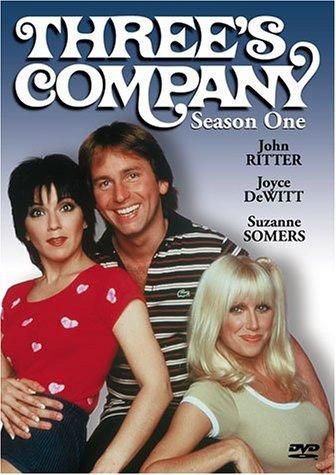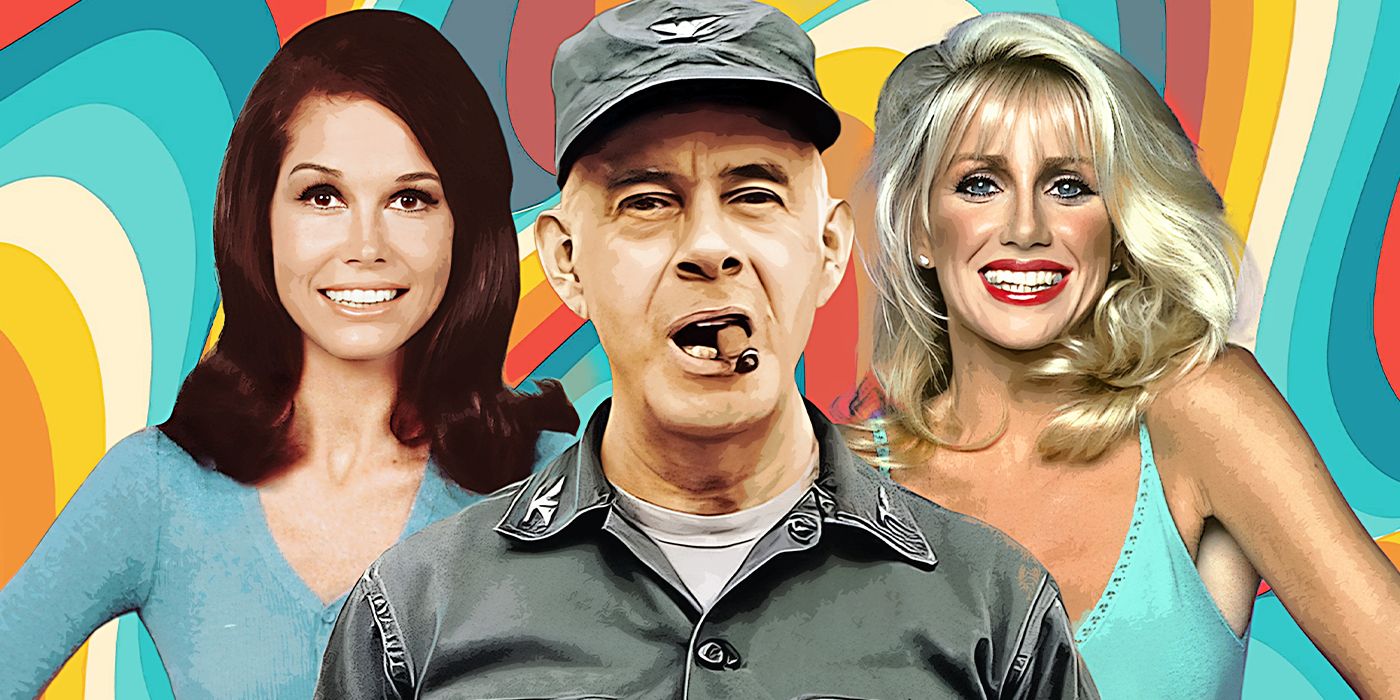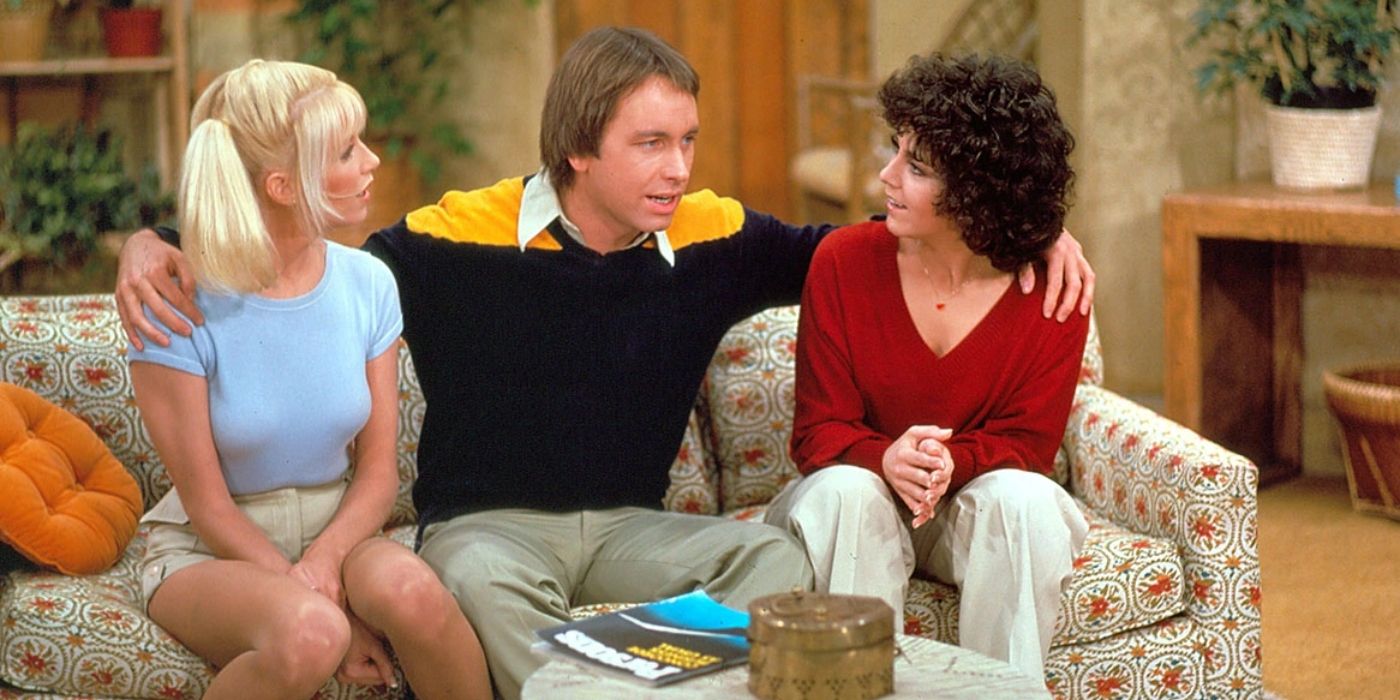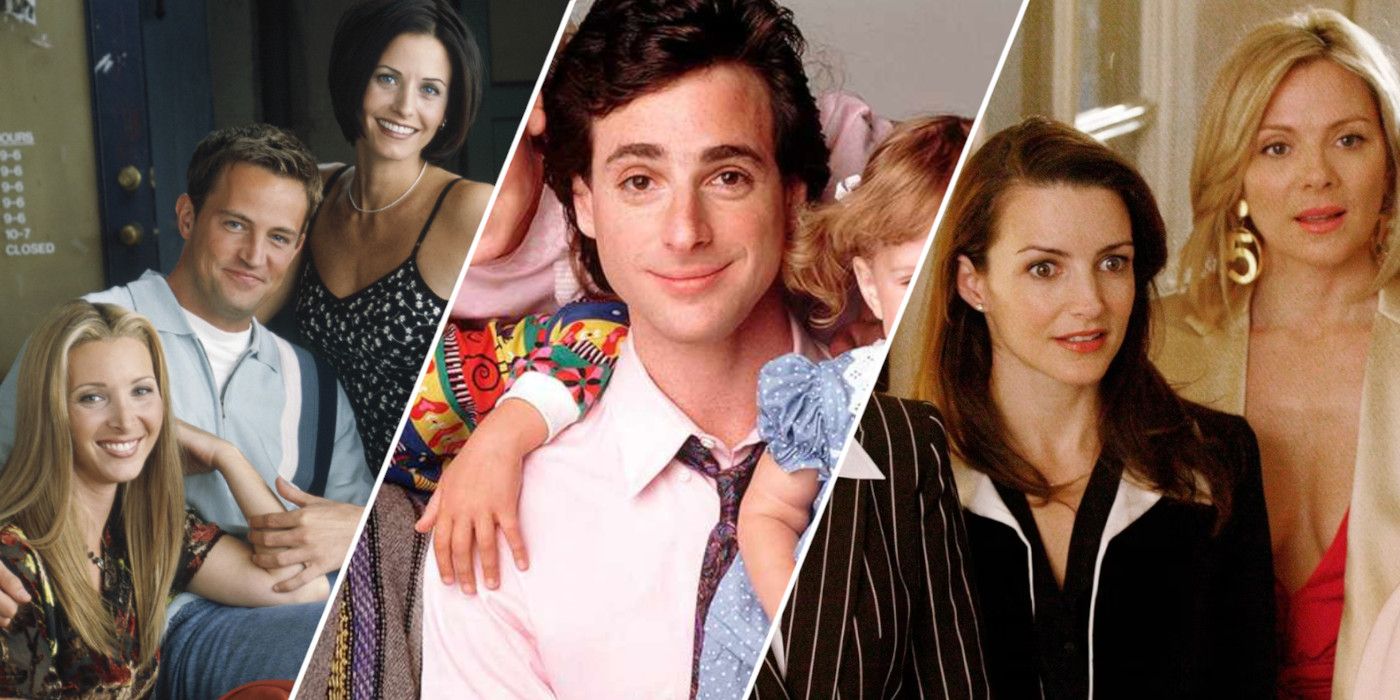The Big Picture
- Three's Company, a classic sitcom from the 1970s, was popular during its time and even won an Emmy, but it hasn't aged well and would likely not be successful if pitched today.
- The show's premise, which revolves around a young man living with two women and pretending to be gay, is inherently funny but also distasteful by contemporary standards.
- Three's Company is loaded with cringe-inducing jokes and innuendo, and some episodes, like "And Justice For Jack," reinforce the show's problematic and dated humor.
If one were to make a list of classic sitcoms from the 1970s, Three's Company would be found among its rankings. The show premiered in 1977 and starred John Ritter, Joyce DeWitt, and Suzanne Somers, and completed its production after eight seasons in 1984. The show was so well-received during its time that it was nominated for five Emmys, one of which it won, and received two spin-offs. Its popularity remained in such positive favor that syndication of the show could be found on stations like IDC and even Nickelodeon during its former Nick at Nite block.
While making note of such an audience and critical reception, it's worth acknowledging that, similar to shows like Friends, it's entirely a product of its time and hasn't aged gracefully. Now, this writer will be the first to fess up as a lover of comedy in all of its forms, and Three's Company has plenty of funny moments. I would even go so far as to say that the world wouldn't have been graced with the talents of its main trio on such a large scale without the series and that the show opened several comedic doors for television's later generations of writers and actors. In that same thought, however, it's also likely that Three's Company wouldn't get far if it were to be pitched today.

Three's Company
The misadventures of two women and one man living in one apartment and their neighbors.
- Release Date
- March 15, 1977
- Creator
- Don Nicholl, Michael Ross, Bernard West, Brian Cooke, Johnnie Mortimer
- Cast
- John Ritter , Joyce DeWitt , Priscilla Barnes , Don Knotts , Richard Kline , Norman Fell
- Main Genre
- Comedy
- Seasons
- 8
'Three's Company's Premise Is Problematic Today
The central plot line of Three's Company focuses on Jack Tripper (Ritter) becoming roommates with two women, Chrissy Snow (Somers) and Janet Wood (DeWitt) following their former roommate's going-away party. In the simplest terms, Jack had been spending his nights at the local YMCA, crashed the party, and woke up in the girls' tub. After getting to know him and finding out he can cook, they offer him their spare room. Certainly, there's nothing questionable about a bunch of twenty-something men and women cohabitating according to even the 1970s standards, but their landlords — originally Stanley (Norman Fell) and Helen Roper (Audra Lindley), and later, Ralph Furley (Don Knotts) — weren't so open-minded. To circumvent any objections they had towards a young man living with two women, the three say that Jack is gay as a cover story. This doubles as a running gag throughout the series where, despite Jack being quite the ladies' man, he must pretend to be gay whenever Roper or Furley are present — lest they kick him out due to their personal beliefs.
To be fair, the idea itself is inherently funny, just as any cover story has the potential to be, and it's clear there's no true malice involved within the writing. If any were to be seen, the majority is from the landlords, as both Roper and Furley spent most of the show jabbing at Jack's perceived sexuality with slurs like "fairy" and "Tinkerbell." Clearly, the role of the landlord was meant to be disliked and antagonistic to some degree, but using someone's sexuality as a punchline repeatedly is incredibly distasteful to contemporary standards. We can think about this in a similar vein as the jokes involving Chandler Bing's (Matthew Perry) homophobia in Friends. Yes, it could be seen as funny for its time, but even watching the reruns today, there's a strong sense that the fans are squirming as the laugh track forces the punchline, and a reason why these shows don't hold up as well as other timeless sitcoms.
'Three's Company' Is Loaded With Innuendo and Homophobic Slurs
True to its times in this manner as well, Three's Company was loaded with in-your-face dirty jokes and innuendo. This ranges from Jack constantly hitting on his roommates and anyone he finds attractive to Larry (Richard Kline) practically setting the inspirational groundwork for successor characters like Family Guy's Glen Quagmire (Seth MacFarlane). There were even some promotional posters with hints of innuendo laced within them, such as those with Jack smiling while feeding Chrissy and Janet salad via a split salad tosser. Of course, this seems harmless on the surface as Jack has a culinary degree and even owns a bistro by the series' end, but there's an equally unfunny and uncomfortable feeling that's present within the picture, and it must be acknowledged.
Admittedly, the innuendo is the least-pressing reason for anyone to criticize the show. Without Three's Company pushing comedic boundaries, we wouldn't have some of today's most highly-rated shows. With that said, watching an episode like "And Now, Here's Jack," where Jack is invited to promote Angelino's (the Italian restaurant he works at) on a television talk show, can be rough. The episode didn't need any of its crude humor as there was plenty of room for jokes about Jack, Terri, and Janet nervously navigating their first time on television. Yet, we only get a hint of this amidst moments like Furley spouting the same, tired gay slurs five years into the show's run, evoking the weird uncle at a holiday gathering who thinks they're being edgy as the room rolls their collective eyes. While they're giving us laughable scenes like Terri Alden (Priscilla Barnes) freezing up and Janet stuttering, the writers are still handing their audience the same old jokes from the male gaze despite their cast being fully capable of executing something better.
"...And Justice For Jack" is 'Three's Company's Most Problematic Episode
If there's any specific reason outside the premise that Three's Company is utterly hard to watch today, it's Season 5, Episode 2. "...And Justice For Jack" can be a difficult one to get through. In summary, Jack is hired by a woman to be a line cook at her diner. On his first day, he gets relentlessly groped and hit on by her in between customer orders. This makes him uncomfortable and unable to do his job, and after addressing it with her, she fires him. After discussing his grievances with Janet, she convinces him to take his old boss to court. This ends with the case being dismissed after the judge recognizes him as a "woman-chasing playboy" despite the truth behind his statements. Upon this accusation, Furley jumps up from his bench to defend Jack due to his belief that Jack is gay, only for Jack to stop him from finishing his sentence and opt to have the case dropped instead.
Within its 20-minute run time, "...And Justice For Jack" reaffirms everything that dates the show's humor as well as what makes it problematic. The dialogue not only relies on the hetero-centric humor typical of Jack and Larry, but it also applies the homophobic slurs that are natural to the show's ebb and flow at this point. The worst part of this is that it now proves that Jack would rather lose his case against his former employer than have anyone other than his landlords think he's gay. Whatever potential this episode had to speak out against sexual harassment was thrown out without a second thought in favor of cheap jokes.
None of this is to say that Three's Company doesn't have its place within television history, nor is it to discredit its fan base. Everyone is entitled to the things they like and there is certainly still an audience for the series, given that there was a reboot movie in the works as recently as 2016. What this writer is saying is that, much like the "Jiggle TV" era in which it was created and of which it held the spirit, Three's Company is problematic and, as an audience, we've grown past it.
Three's Company is available to watch on Pluto TV.



